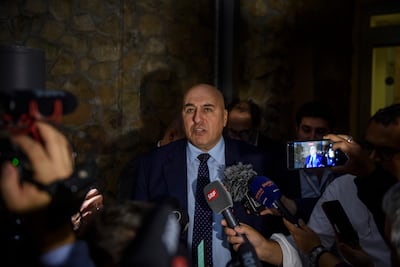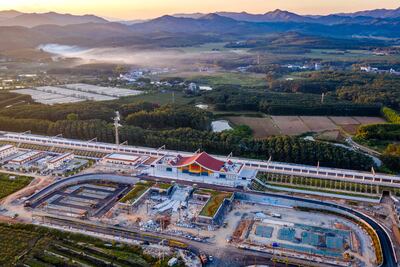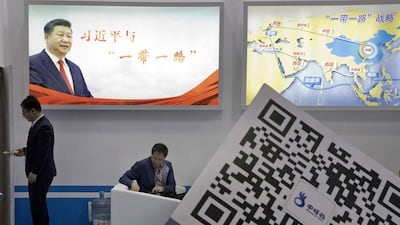When Italy joined China’s Belt and Road Initiative in 2019, it was a big deal. A majority of the world – 148 states – may have signed up to the ambitious global investment programme at the time, but Italy was the only member of the G7 to do so. Despite northern European stereotypes about it being a country of style and siestas, it is globally the eighth-largest economy. Italy being in the BRI gave weight to the idea that the ancient Silk Roads could be revived throughout the breadth of the Eurasian landmass.
But now the country’s defence minister, Guido Crosetto, has not only suggested that the agreement should not be renewed automatically next March. He has said that the decision to join in the first place was an “improvised and wicked act”. This is very strange and emotional language to use about a loose association that aims to boost trade and build much-needed infrastructure. It is also inconsistent with Mr Crosetto’s aim of walking back from the BRI “without damaging relations” with Beijing, as he put it in an interview with the Italian newspaper Corriere della Sera.
But his words are not backed by the facts in any case. “We exported a load of oranges to China, they tripled exports to Italy in three years,” complained Mr Crosetto. But Politico reports that: “Chinese exports to Italy increased 51 per cent from 2019 to 2022, while China's imports from the EU country rose by 26 per cent during the same years, according to Italy’s Trade Agency.” That’s either an awful lot of oranges, or it’s way more substantial than that.
If the Italian government wanted to leave the BRI, it could done so diplomatically
What is true is that Chinese foreign direct investment in Italy has been very low over the past few years. So if the Italian government wanted to leave the BRI, it could have done so diplomatically by citing those figures and saying that the partnership hadn’t really worked out, but had been a worthwhile effort.
Instead, Mr Crosetto has used words that appear calculated to offend, playing straight into the narrative that the BRI is either some kind of con trick or a cunning ploy by which other countries will unwittingly end up under Beijing’s influence. It is no surprise that several reports about his explosive intervention all refer to China’s “controversial” BRI, as though the adjective naturally attaches itself to the initiative.
That is not a view, however, that is supported by any objective study of the BRI. The European Bank for Reconstruction and Development, for instance, describes it more soberly and sensibly: “China’s Belt and Road Initiative is a strategy initiated by the People’s Republic of China that seeks to connect Asia with Africa and Europe via land and maritime networks with the aim of improving regional integration, increasing trade and stimulating economic growth. The BRI has been associated with a very large programme of investments in infrastructure development for ports, roads, railways and airports, as well as power plants and telecommunications networks … The BRI now places increasing emphasis on ‘high quality investment’, including through greater use of project finance, risk mitigation tools, and green finance.”
As someone who represented Malaysia at a conference on the BRI in Bangladesh, in the heart of a region – South and South-East Asia – that has direct knowledge of the BRI’s effects, I say: that’s more like it.
One of my fellow speakers, Dr Zhang Jiadong of China’s Fudan University, put it aptly. The BRI is not a new form of Chinese colonisation, he said, neither is it a strategy. “It is a process” whose focus had shifted “from economic development to constructing a community of ‘shared destiny for all mankind’”.
A 2020 report published by Chatham House, titled Debunking the Myth of “Debt-trap Diplomacy”, defused one of the main charges against the BRI, with the authors concluding that “developing country governments are not hapless victims of a predatory Beijing. They – and their associated political and economic interests – determine the nature of BRI projects on their territory”.
That includes negotiating with Chinese state-owned firms to ensure that local populations make up a satisfactory proportion of the workforce on projects, and undertaking analyses into affordability, sustainability and long-term returns on investment. Just being responsible, in other words.
Italy’s Mr Crosetto either has such a low opinion of his colleagues that he thinks they are not capable of behaving in such a manner if his country remains in the BRI, or he simply wants to have as little as possible to do with China or Chinese firms. Either way, if his aim was truly not to damage relations with Beijing, he would appear to have failed by speaking so discourteously.
Thus far, the reaction has been mild. An editorial on viewing the BRI as a “trojan horse” in the Chinese Communist Party’s Global Times stated: “We do not want to see a closed and conservative Europe, and China has no intention to change Europe … The intermingling and interaction of different civilisations is the path to joint development in the new era.”
If Italy, and Europe as a whole, cannot see the BRI as “a pathway through which we can collaborate and enhance mutual understanding”, as Global Times puts it, but instead insists on demonising it in the crudest terms on the basis of cherry-picked facts and unsubstantiated smears, a huge opportunity will have been lost. And as a European living in Asia, it dismays me to see such unwarranted hostility to what could be the 21st century’s greatest trading initiative – all because it is led by China.
I Feel Pretty
Dir: Abby Kohn/Mark Silverstein
Starring: Amy Schumer, Michelle Williams, Emily Ratajkowski, Rory Scovel
The%20specs%20
%3Cp%3E%3Cstrong%3EEngine%3A%20%3C%2Fstrong%3E2.0-litre%204cyl%20turbo%0D%3Cbr%3E%3Cstrong%3EPower%3A%20%3C%2Fstrong%3E261hp%20at%205%2C500rpm%0D%3Cbr%3E%3Cstrong%3ETorque%3A%20%3C%2Fstrong%3E400Nm%20at%201%2C750-4%2C000rpm%0D%3Cbr%3E%3Cstrong%3ETransmission%3A%20%3C%2Fstrong%3E7-speed%20dual-clutch%20auto%0D%3Cbr%3E%3Cstrong%3EFuel%20consumption%3A%20%3C%2Fstrong%3E10.5L%2F100km%0D%3Cbr%3E%3Cstrong%3EOn%20sale%3A%20%3C%2Fstrong%3ENow%0D%3Cbr%3E%3Cstrong%3EPrice%3A%20%3C%2Fstrong%3EFrom%20Dh129%2C999%20(VX%20Luxury)%3B%20from%20Dh149%2C999%20(VX%20Black%20Gold)%3C%2Fp%3E%0A
COMPANY PROFILE
Founders: Alhaan Ahmed, Alyina Ahmed and Maximo Tettamanzi
Total funding: Self funded
Specs
Engine: Dual-motor all-wheel-drive electric
Range: Up to 610km
Power: 905hp
Torque: 985Nm
Price: From Dh439,000
Available: Now
ATP RANKINGS (NOVEMBER 4)
1. Rafael Nadal (ESP) 9,585 pts ( 1)
2. Novak Djokovic (SRB) 8,945 (-1)
3. Roger Federer (SUI) 6,190
4. Daniil Medvedev (RUS) 5,705
5. Dominic Thiem (AUT) 5,025
6. Stefanos Tsitsipas (GRE) 4,000 ( 1)
7. Alexander Zverev (GER) 2,945 (-1)
8. Matteo Berrettini (ITA) 2,670 ( 1)
9. Roberto Bautista (ESP) 2,540 ( 1)
10. Gaël Monfils (FRA) 2,530 ( 3)
11. David Goffin (BEL) 2,335 ( 3)
12. Fabio Fognini (ITA) 2,290
13. Kei Nishikori (JPN) 2,180 (-2)
14. Diego Schwartzman (ARG) 2,125 ( 1)
15. Denis Shapovalov (CAN) 2,050 ( 13)
16. Stan Wawrinka (SUI) 2,000
17. Karen Khachanov (RUS) 1,840 (-9)
18. Alex De Minaur (AUS) 1,775
19. John Isner (USA) 1,770 (-2)
20. Grigor Dimitrov (BUL) 1,747 ( 7)
Barbie
%3Cp%3E%3Cstrong%3EDirector%3A%3C%2Fstrong%3E%20Greta%20Gerwig%3Cbr%3E%3Cstrong%3EStars%3A%3C%2Fstrong%3E%20Margot%20Robbie%2C%20Ryan%20Gosling%2C%20Will%20Ferrell%2C%20America%20Ferrera%3Cbr%3E%3Cstrong%3ERating%3A%3C%2Fstrong%3E%204%2F5%3Cbr%3E%3C%2Fp%3E%0A
Scorline
Iraq 1-0 UAE
Iraq Hussein 28’
Muguruza's singles career in stats
WTA titles 3
Prize money US$11,128,219 (Dh40,873,133.82)
Wins / losses 293 / 149
Surianah's top five jazz artists
Billie Holliday: for the burn and also the way she told stories.
Thelonius Monk: for his earnestness.
Duke Ellington: for his edge and spirituality.
Louis Armstrong: his legacy is undeniable. He is considered as one of the most revolutionary and influential musicians.
Terence Blanchard: very political - a lot of jazz musicians are making protest music right now.
MATCH INFO
Champions League quarter-final, first leg
Ajax v Juventus, Wednesday, 11pm (UAE)
Match on BeIN Sports
Groom and Two Brides
Director: Elie Semaan
Starring: Abdullah Boushehri, Laila Abdallah, Lulwa Almulla
Rating: 3/5
Results:
CSIL 2-star 145cm One Round with Jump-Off
1. Alice Debany Clero (USA) on Amareusa S 38.83 seconds
2. Anikka Sande (NOR) For Cash 2 39.09
3. Georgia Tame (GBR) Cash Up 39.42
4. Nadia Taryam (UAE) Askaria 3 39.63
5. Miriam Schneider (GER) Fidelius G 47.74
The biog
Favourite food: Tabbouleh, greek salad and sushi
Favourite TV show: That 70s Show
Favourite animal: Ferrets, they are smart, sensitive, playful and loving
Favourite holiday destination: Seychelles, my resolution for 2020 is to visit as many spiritual retreats and animal shelters across the world as I can
Name of first pet: Eddy, a Persian cat that showed up at our home
Favourite dog breed: I love them all - if I had to pick Yorkshire terrier for small dogs and St Bernard's for big
THE LOWDOWN
Romeo Akbar Walter
Rating: 2/5 stars
Produced by: Dharma Productions, Azure Entertainment
Directed by: Robby Grewal
Cast: John Abraham, Mouni Roy, Jackie Shroff and Sikandar Kher
Abdul Jabar Qahraman was meeting supporters in his campaign office in the southern Afghan province of Helmand when a bomb hidden under a sofa exploded on Wednesday.
The blast in the provincial capital Lashkar Gah killed the Afghan election candidate and at least another three people, Interior Minister Wais Ahmad Barmak told reporters. Another three were wounded, while three suspects were detained, he said.
The Taliban – which controls much of Helmand and has vowed to disrupt the October 20 parliamentary elections – claimed responsibility for the attack.
Mr Qahraman was at least the 10th candidate killed so far during the campaign season, and the second from Lashkar Gah this month. Another candidate, Saleh Mohammad Asikzai, was among eight people killed in a suicide attack last week. Most of the slain candidates were murdered in targeted assassinations, including Avtar Singh Khalsa, the first Afghan Sikh to run for the lower house of the parliament.
The same week the Taliban warned candidates to withdraw from the elections. On Wednesday the group issued fresh warnings, calling on educational workers to stop schools from being used as polling centres.
'Peninsula'
Stars: Gang Dong-won, Lee Jung-hyun, Lee Ra
Director: Yeon Sang-ho
Rating: 2/5
COMPANY PROFILE
Name: Xpanceo
Started: 2018
Founders: Roman Axelrod, Valentyn Volkov
Based: Dubai, UAE
Industry: Smart contact lenses, augmented/virtual reality
Funding: $40 million
Investor: Opportunity Venture (Asia)
UAE currency: the story behind the money in your pockets
Copa del Rey
Semi-final, first leg
Barcelona 1 (Malcom 57')
Real Madrid (Vazquez 6')
Second leg, February 27
Results:
6.30pm: Maiden Dh 165,000 1,400m.
Winner: Walking Thunder, Connor Beasley (jockey), Ahmad bin Harmash (trainer).
7.05pm: Handicap (rated 72-87) Dh 165,000 1,600m.
Winner: Syncopation, George Buckell, Doug Watson.
7.40pm: Maiden Dh 165,000 1,400m.
Winner: Big Brown Bear, Pat Dobbs, Doug Watson.
8.15pm: Handicap (75-95) Dh 190,000 1,200m.
Winner: Stunned, Pat Dobbs, Doug Watson.
8.50pm: Handicap (85-105) Dh 210,000 2,000m.
Winner: New Trails, Connor Beasley, Ahmad bin Harmash.
9.25pm: Handicap (75-95) Dh 190,000 1,600m.
Winner: Pillar Of Society, Pat Dobbs, Doug Watson.
Details
Through Her Lens: The stories behind the photography of Eva Sereny
Forewords by Jacqueline Bisset and Charlotte Rampling, ACC Art Books
MATCH INFO
First Test at Barbados
West Indies won by 381 runs
Second Test at Antigua
West Indies won by 10 wickets
Third Test at St Lucia
February 9-13
Email sent to Uber team from chief executive Dara Khosrowshahi
From: Dara
To: Team@
Date: March 25, 2019 at 11:45pm PT
Subj: Accelerating in the Middle East
Five years ago, Uber launched in the Middle East. It was the start of an incredible journey, with millions of riders and drivers finding new ways to move and work in a dynamic region that’s become so important to Uber. Now Pakistan is one of our fastest-growing markets in the world, women are driving with Uber across Saudi Arabia, and we chose Cairo to launch our first Uber Bus product late last year.
Today we are taking the next step in this journey—well, it’s more like a leap, and a big one: in a few minutes, we’ll announce that we’ve agreed to acquire Careem. Importantly, we intend to operate Careem independently, under the leadership of co-founder and current CEO Mudassir Sheikha. I’ve gotten to know both co-founders, Mudassir and Magnus Olsson, and what they have built is truly extraordinary. They are first-class entrepreneurs who share our platform vision and, like us, have launched a wide range of products—from digital payments to food delivery—to serve consumers.
I expect many of you will ask how we arrived at this structure, meaning allowing Careem to maintain an independent brand and operate separately. After careful consideration, we decided that this framework has the advantage of letting us build new products and try new ideas across not one, but two, strong brands, with strong operators within each. Over time, by integrating parts of our networks, we can operate more efficiently, achieve even lower wait times, expand new products like high-capacity vehicles and payments, and quicken the already remarkable pace of innovation in the region.
This acquisition is subject to regulatory approval in various countries, which we don’t expect before Q1 2020. Until then, nothing changes. And since both companies will continue to largely operate separately after the acquisition, very little will change in either teams’ day-to-day operations post-close. Today’s news is a testament to the incredible business our team has worked so hard to build.
It’s a great day for the Middle East, for the region’s thriving tech sector, for Careem, and for Uber.
Uber on,
Dara
SHADOWS%20AND%20LIGHT%3A%20THE%20EXTRAORDINARY%20LIFE%20OF%20JAMES%20MCBEY
%3Cp%3EAuthor%3A%20Alasdair%20Soussi%3C%2Fp%3E%0A%3Cp%3EPages%3A%20300%3C%2Fp%3E%0A%3Cp%3EPublisher%3A%20Scotland%20Street%20Press%3C%2Fp%3E%0A%3Cp%3EAvailable%3A%20December%201%3C%2Fp%3E%0A




